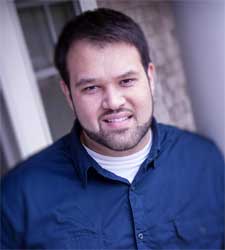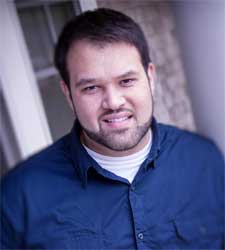 KINGSTON, R.I. — May 7, 2012 – As Erick Betancourt drove onto campus one day in February, a belt broke on his 1996 Oldsmobile, making it impossible to drive. As the rain poured down, the University of Rhode Island theater major tried to get as close as he could to the Fine Arts building on campus before parking his car and running to class.
KINGSTON, R.I. — May 7, 2012 – As Erick Betancourt drove onto campus one day in February, a belt broke on his 1996 Oldsmobile, making it impossible to drive. As the rain poured down, the University of Rhode Island theater major tried to get as close as he could to the Fine Arts building on campus before parking his car and running to class.
As the burly senior who will earn his degree in May stepped into class, soaked through from the rain, he reflected on how different his life had become.
It was only 10 years ago that Betancourt, who is of Puerto Rican descent, was driving luxury vehicles, wearing expensive clothes and enjoying his status at Providence nightclubs. He could afford nice clothes and never worried about studying for an exam or memorizing his lines.
Betancourt was selling drugs, but he never had to worry about his car breaking down in the rain and slush.
That morning run through the foul weather was enough to make the 32-year-old wonder if his time at the University of Rhode Island was really worth it, if he’d ever be able to take advantage of the opportunities afforded him by going to college.
Until he checked his email.
It was that morning when Betancourt, who split time growing up between the Bronx and the Manton Heights area of Providence, received notice that he’d been accepted to The Actor’s Studio, the prestigious New York City school for professional actors, theater directors and playwrights.
Before that day, Betancourt had more in common with Tony Montana, the Hispanic drug lord in the 1983 film Scarface, than he did with the actor who played Montana, Al Pacino. Now, Betancourt will study the same techniques with many of the same teachers as Pacino, who studied at The Actor’s Studio and now serves as its co-president with Ellen Burstyn and Harvey Keitel.
“I started crying,” Betancourt said of reading his acceptance email. “I was about to break down before I found out. When I sold drugs, I drove nice cars, my friends and I were VIPs in the club. But I had to put my pride to the side to change my life and do it through hard work.”
That hard work began while Betancourt was incarcerated at Rhode Island’s Adult Correctional Institutions after being sentenced to three and half years for possessing crack cocaine.
Betancourt, who primarily sold drugs but described himself as a casual user of marijuana, was so sure he was going to end up back in prison after being released, he initially considered serving his entire sentence rather than accepting parole after two years.
“I didn’t have anything to look forward to,” said Betancourt, who was imprisoned from January 2003 until December 2004. “What, was I going to do, go live in the projects and sell drugs again? I was ashamed. I wanted to stay in prison.”
But his older brother Fernando told him to start taking classes or learn a trade while in prison and figure out a plan to land a job once he was out. Part of that plan was to stay away from his former associates to avoid the temptation to begin selling drugs again. In addition, Erick began taking barber classes and other courses through the Community College of Rhode Island.
Fortuitously, while at the ACI, he met Bruce Reilly, an inmate who was writing a play. About a year after his release, Betancourt bumped into Reilly, who had managed to get his play, House of Death – “an often hilarious look at human nature through the eyes of a quiet and unassuming fellow: Death” — into production at Providence’s Perishable Theater.
He gave Betancourt a few lines in the play and everything seemed to click for him. The words of his brother, who has a master of fine arts in theater and is working in New York to become a professional actor, spurred Betancourt to pursue his newfound dream.
“My brother saw the play and he said, ‘You did what every actor wants to do, you brought a human being to the role,’” Betancourt said.
Betancourt began taking acting classes at Trinity Repertory Company and auditioned for roles at Perishable Theatre. He served as an extra on the Showtime series Brotherhood. He also began trying to get into URI so he could study theater.
It took several CCRI courses and two tries before he was finally accepted to Rhody. Once on campus, Betancourt was determined to take full advantage of his time at the University. He not only studied theater and performed in productions such as The Rocky Horror Picture Show and Tartuffe, he taught Theater 100 as a teacher’s assistant and began working with the Talent Development program, speaking with incoming freshmen about the value of their education and hard work.
He also began speaking at middle schools about nonviolence and bullying prevention, and he has gone back to the ACI to speak with inmates in an effort to show them they don’t have to land back in prison once they’re released.
“I believe that to be a leader, you have to serve first, and that’s what I’m doing,” he said.
That attitude is a far cry from the young man who spent part of his 20s in a jail cell, and Betancourt knows it.
“I’m two different people,” he said. “I’m so thankful for evolution; that you can be one thing and grow to be something better.”
Betancourt, who got through URI with student loans and financial aid, said his pursuit of a better life has been costly, but his time at URI was worth the investment.
“The University is on your side,” he said. “It will open doors for you if you stay faithful and put in the work.”
And now he hopes he can parlay one more big investment into the success he has dreamed of.
“I took out loans and rolled the dice on myself,” he said. “I’m leaving URI and I owe money, but I’m going to bet on myself again. I’m hoping that by rolling the dice again, I can win big. If I have to spend a few years eating peanut butter and jelly sandwiches, I’m OK with that.”
URI Department of Communications & Marketing photo by Michael Salerno Photography.


 Commencement Information
Commencement Information